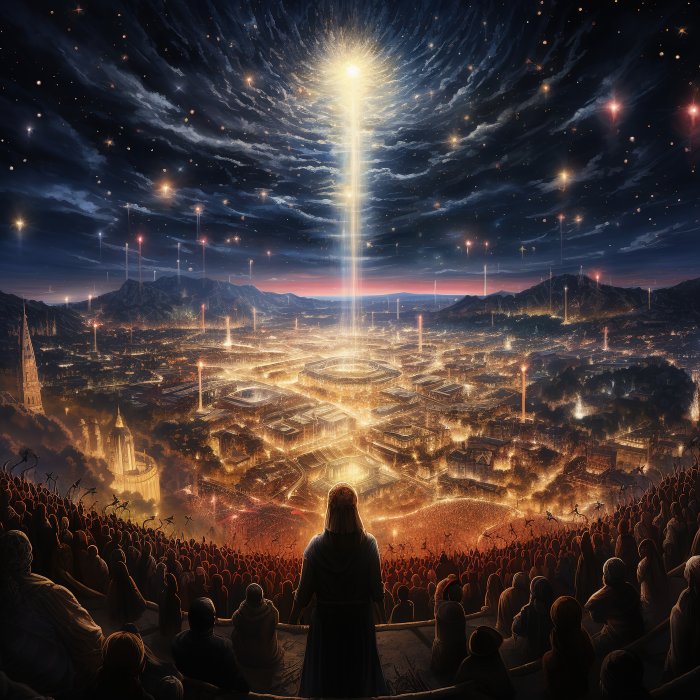Ellen Lloyd – AncientPages.com – The beautiful legend of the Milky Way’s celestial portal is one of many fascinating old stories found in the book Bowuzhi, written by Zhang Hua (232-300 C.E.), a Chinese poet and politician of the Western Jin dynasty.
The intriguing book Bowuzhi is an anthology of short narratives compiled in an encyclopedic format. Primarily, the Bowuzhi documents accounts of unusual occurrences and supernatural phenomena, earning it the title as the precursor to the Song Dynasty’s (960–1127 C.E.) encyclopedia, Taiping Guangji.
The content ranges from geographical reports and historical figures to peculiar flora and fauna and folklore involving fairies, deities and immortals. Most of these stories are derived from diverse ancient sources, such as geographical dissertations, biographies of historical figures or records about extraordinary plants and animals.
The Raft In The Sky
The legend of Milky’s Ways celestial portal is almost like a Song Dynasty science fiction story.
The legend tells the Milky Way is connected with the sea. As it happened, a man who lived on an island on the sea noticed that every year in August, “there was a raft which came floating by, and that it never failed to come at the expected time.” 1
The man became intrigued and wished to explore this phenomenon in greater depth.
Consequently, he constructed a lofty tower on the raft, equipped it with abundant supplies, and embarked on a journey aboard it.
While journeying towards the Milky Way, he observed the stars, the Sun, and the Moon. However, after several weeks, these celestial bodies disappeared from view and his surroundings became indistinguishable. The concept of day and night lost meaning to him as he found himself without any sense of direction or orientation in space.
The Shining Star City
“After about two weeks like this he suddenly arrived at a place where there was something like inner and outer city battlements, and the buildings were very majestic.
The man thought he saw a shining star city. Credit: Adobe Stock – NiponTK
In the distance, he saw that there were many weaving women in the palace. He also saw a man leading a cow to the riverbank to drink
The cowherd was surprised to see him and asked, “How have you come here?”
The man told him in full the reason for his coming, and asked where he was.
The cowherd replied, “If you visit Yan Junping in Shu on your return you will get to know.”
So, in the end, the man did not disembark, but returned on the raft at the appointed time.
Later he visited Junping in Shu, and asked him; Junping said that on a certain day of a certain month, in a certain year, there had been a nova which had encroached on Altair, and when he had computed the dates, it actually was the time when the man had visited the Milky Way.” 1
The Milky Way holds a special place in ancient Chinese folklore tales, myths, and legends.
For example, “an ancient, romantic legend tells about Niulang and Zhinyu, who are separated by the Heavenly Queen and allowed to meet once a year on the seventh night of the seventh month, on a bridge across the Milky Way formed by magpies.
This unique event is celebrated in the Qixi Festival, or the Seventh Night Festival, which can be traced back to the Han Dynasty in China.” 2
Scholars emphasize that the concept of a connection between the ocean and the Milky Way was not exclusive to Zhang Hua. This topic was also addressed by Ge Hong (283 – 343 A.D.), a renowned Daoist master and physician who holds the distinction of being the first scholar to pen down thoughts on alchemy.
In his works, Ge Hong offered a “strange alternative theory that the tides are due to the ‘overflowing’ of the Milky Way, which passes under the sea in the diurnal revolution of the Heavens.” 2
Written by Ellen Lloyd – AncientPages.com
Copyright © AncientPages.com All rights reserved. This material may not be published, broadcast, rewritten or redistributed in whole or part without the express written permission of AncientPages.com
Expand for references
- Hua Zhang, Roger Greatrex – The Bowu Zhi: An Annotated Translation, 1987
- Ellen Lloyd – Controversial Stone Statues Of Niulang And Zhinyu And The Legend Of The Heavenly Queen And Milky Way – AncientPages.com
- XingWu – ChineseFolklore – A Jin Dynasty Sci-fi



